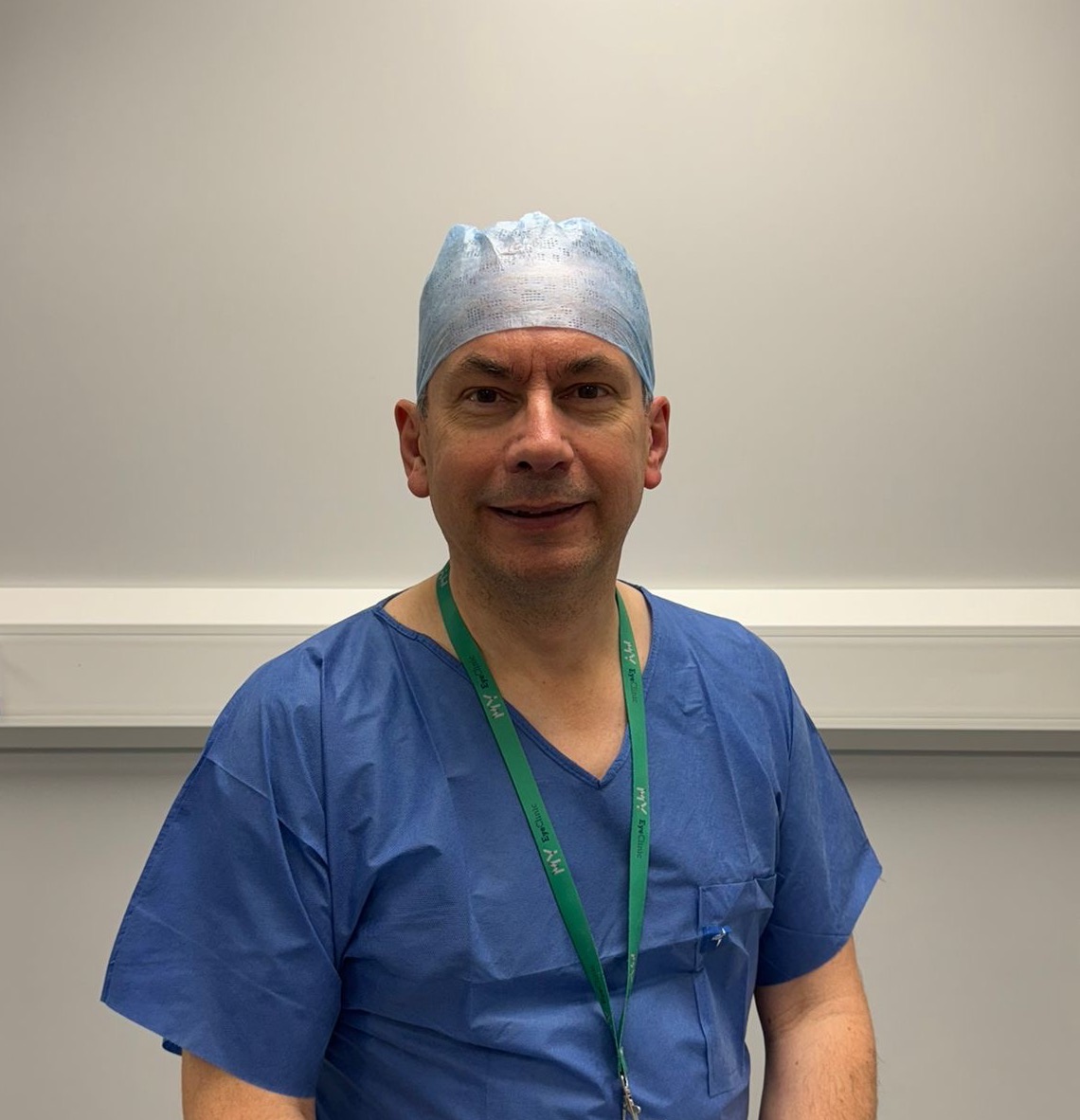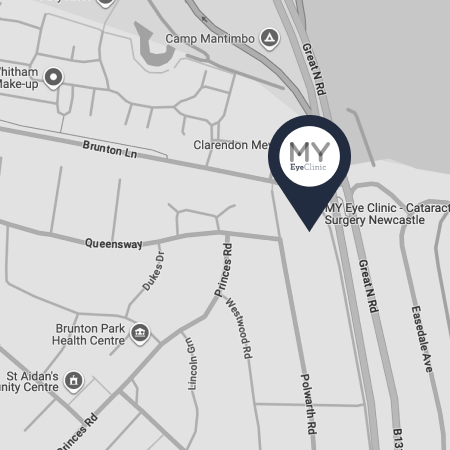Your questions answered about retinal treatments
Explore how our advanced treatments can restore your retinal health and enhance your quality of life
Retinal problems are increasingly common, especially with age.
Floaters
Floaters, often linked to vitreous degeneration, affect nearly everyone at some point, though they’re usually harmless. Floaters tend to increase as we get older. A posterior vitreous detachment (PVD) is a natural age-related change in the eye, where the vitreous gel peels away from the retina. This occurs in 70% of people by the age of 70.
People with a new PVD often are aware of a cobweb or net curtain-like floater that can be quite intrusive at first. Floaters due to a PVD are harmless, although occasionally annoying. They usually become much less obvious with time as the brain adjusts to the change and eventually filters them out.
Epiretinal membranes
An Epiretinal Membrane (ERM) is an area of scar tissue that forms on the surface of the retina. The part of the eye affected by the ERM is called the macula. This is located in the centre of the retina and is responsible for the sharpest vision. The macula has special photoreceptor cells providing our sharp central vision needed for seeing especially fine detail (reading and driving etc.). When an Epiretinal Membrane Disease of the Macula, may cause it to contract and pucker. This can result in the symptoms of distorted and/or blurred vision.
Macular holes
The back of the eye has a light-sensitive lining called the retina, like the film in a camera. Light is focused through the eye onto the retina, allowing us to see. The centre part of the retina is called the macula – it is here that light must be focused for us to see fine detail, to be able to read and see in colour.
Macular holes are less common, with an incidence of around 0.3%, primarily affecting people over 60.
Age-related macular degeneration
AMD is the most common cause of severe loss of eyesight among people 50 years and older. The central part of the retina called the macula is damaged affecting fine central vision. Initially AMD may have no symptoms or signs. In advanced AMD people lose the ability to drive, to see faces and to read smaller print. People very rarely go blind from AMD.
There are two main types of AMD, dry and wet.
Dry AMD is the most common (80% of AMD). Light sensitive cells at the macula slowly break down resulting in a slow and gradual reduction in vision.
Wet AMD is less common, but it usually leads to more severe vision loss. Wet AMD occurs when abnormal blood vessels start to grow beneath the retina, leaking fluid and blood. A large blind spot in the centre of the visual field can result.
Retinal problems arise from various causes, often related to ageing or other eye conditions.
Floaters
In rare cases, a PVD causes a tear in the retina, which can progress to a retinal detachment, causing floaters. This uncommon event occurs in approximately 1 in 10,000 people per year.
A tear in the retina causes a sudden increase in small dot-like floaters, and flashes in the peripheral vision. Some people also notice a curtain effect coming in from their peripheral visual field. If you notice these symptoms, you should seek urgent attention by an eye doctor.
Inflammation in the eye is a rare cause of floaters
Epiretinal membranes
In most cases the development of an Epiretinal Membrane Disease appears to be related to normal ageing changes inside the eye.
In some cases, it can be related to other conditions such as diabetes, blockage of a blood vessel, inflammation or following retinal surgery.
ERMs are related to Macular Degeneration, they do not generally affect the other eye.
ERMs are quite common and affect up to 8% of people in later years.
Macular holes
Macular holes are usually caused by vitreous traction, where the gel pulls on the macula, creating a hole.
They most often occur in people aged 60-80 and are twice as common in women as men.
Other causes of macular holes include severe trauma to the eye and being very short-sighted (myopic).
Age-related macular degeneration
Risk factors for AMD include:
- Being over 50
- Eating a diet high in saturated fat
- Smoking
- High blood pressure
Floaters
Floaters can take a variety of appearances such as small black dots, short squiggly lines, or even large cobweb shapes.
People with a new PVD often are aware of a cobweb or net curtain-like floater that can be quite intrusive at first.
Epiretinal membranes
Epiretinal membrane symptoms include distorted and/or blurred vision. Straight lines may become kinked or curved.
Macular holes
Blurred central vision and distortion, where straight lines appear wavy.
In the majority of patients, the central vision will gradually get worse to a level where the patient is unable to read even the largest print on an eye test chart.
The condition does not affect the peripheral vision, and so patients will not go completely blind from this condition.
Age-related macular degeneration
Symptoms of AMD include:
- Blurry or fuzzy vision
- Difficulty recognising familiar faces
- Straight lines appear wavy
- A dark, empty area or blindspot appears in the centre of your vision
Floaters
Usually floaters are not treated, because they are harmless and do not cause significant visual problems. Surgery to remove floaters is an option for people who have very severe floaters or who have great difficulty adapting to them.
Epiretinal membranes
Your eye doctor can detect an ERM during an eye examination following the use of eye drops. These will make your pupils large for a couple of hours.
An epiretinal membrane OCT scan of the retina can confirm the presence of an ERM.
Your eye doctor will assess your symptoms, your vision and your OCT scans to help you decide whether to proceed with surgery.
Macular holes
If untreated, there is a small chance, about 1 in 10, that some macular holes can close spontaneously, with improvement in vision. Careful examination can assess the risk of developing a macular hole in the other eye. Your surgeon will tell you your risk, but this may be from extremely unlikely to a 1 in 10 chance. It is very important to monitor for any changes in vision of the fellow eye, and report these to your eye specialist/family doctor/optician urgently.
A macular hole can often be repaired by an operation called a vitrectomy, peel & gas. If the hole has been present for less than a year, the operation will be successful in closing the hole in about 90% of cases. Of these, more than 70% will be able to see two or three more lines down a standard vision chart, compared to before the operation.
Even if this degree of improvement does not occur, the vision is at least stabilised, and many patients will find that they have less distortion. In a minority of patients, who often have very large macular holes, the hole does not close despite surgery and the central vision can continue to deteriorate; however, a second operation can still be successful in closing the hole.
It is important to understand that return to completely normal vision is not possible and that vision improvement depends on factors other than purely closure of the hole, particularly the condition of the light-sensing retinal cells (photoreceptors).
Age-related macular degeneration
There are currently no treatments available for dry AMD though low-vision devices can be very helpful to perform activities of daily living.
The main treatment of wet AMD is regular intraocular injections of Anti-VEGF medicines which treat the abnormal blood vessels. This can stabilise the vision in many patients and even improve the vision in some patients.
Restore your vision in 3 simple steps
Finding the right retinal treatment can feel overwhelming, but we’ve made the process easy and supportive for you

Step 1: Get in touch
Not all retinal treatments are suitable for everyone. The first step is to determine if a retinal procedure is the right solution for you and which treatment option best meets your needs. Call our friendly team at 0191 917 8887 or use our easy online calendar to book an assessment.

Step 2: We'll meet
During your assessment, our specialists will develop a tailored treatment plan for you, whether it involves advanced laser therapy, injections, or other retinal solutions, all aimed at achieving the best possible outcome for your vision.

Step 3: Enjoy freedom
After your procedure, experience clearer, healthier vision with lasting results. We’ll provide ongoing support and care to help you maintain your improved eyesight for years to come.
Join thousands who’ve gained freedom from glasses and contacts
Discover how they ditched their dependence and see how you can, too
We have replaced the images of real patients who provided these testimonials to protect their privacy.

Hi, I’m Rob Boyce
After training as an engineer and research scientist, I pursued medicine at Nottingham University, followed by advanced ophthalmology training. With over 20 years as a Consultant Ophthalmologist specialising in Oculoplastic and Lacrimal Surgery, I’m committed to delivering the highest quality care at MY Eye Clinic, using cutting-edge techniques and patient-centred care.
Mr Rob Boyce
Founder and Owner of MY Eye Clinic











